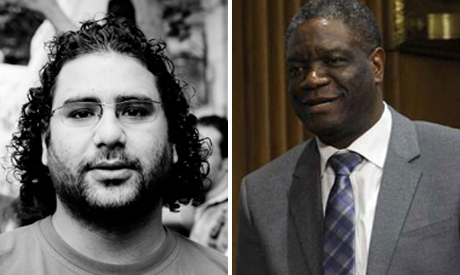
Prominent Egyptian blogger and activist Alaa Abdel Fattah (R) and Congolese gynecologist Denis Mukwege who campaigns against sexual violence targeting women in war (L) (Photo: AP)
A Congolese gynaecological surgeon has won the European Parliament’s 2014 Sakharov Prize for Freedom of Thought, previously denied to Egyptian activist Alaa Abdel-Fattah for an "anti-Semitic" tweet.
Surgeon Denis Mukwege, 59, received the award for his work to protect female victims of rape in the Congo.
"[Mukwege] founded the Panzi Hospital in Bukavu in 1998, when a war took place in the Democratic Republic of Congo, where today he still treats victims of sexual violence who have sustained serious injuries," said a statement on the European Parliament's website.
The European United Left/Nordic Green Left (GUE/NGL) – a left-wing political group in the European Parliament that originally nominated Abdel-Fattah – withdrew its nomination after a 2012 tweet resurfaced in which Abdel-Fattah mentioned killing Israelis. Pro-Israeli media outlets described the tweet as "anti-Semitic".
"We cannot and will not tolerate such behaviour ... Our group has always favoured debate over political confrontation between peoples, including the Israeli people," GUE/NGL said in a statement on 1 October, withdrawing its nomination for Abdel-Fattah.
In response, Abdel-Fattah, a long time advocate of Palestian rights, said that what he had written about killing Israelis on Twitter was "taken out of context" and part of a "private conversation" on the night of the November 2012 Israeli offensive on Gaza that killed over 100 Palestinians.
Abdel-Fattah, a longtime activist, gained prominence after the 25 January 2011 uprising.
He was jailed for his anti-government activism during the Mubarak years, the one-year-rule of the Military Council following 25 January, and again during the one-year-rule of the Muslim Brotherhood.
He is currently out of jail on bail after appealing a 15-year prison sentence for violating Egypt's controversial protest law and attacking security forces in November 2013 after Morsi's ousting.
Abdel-Fattah joined a hunger strike movement during his most recent stint in prison to protest the detention of political activists and the protest law.
Short link: